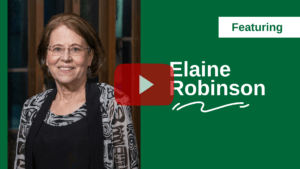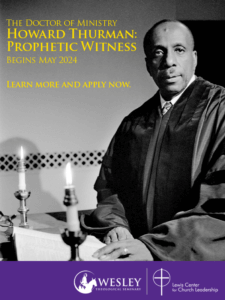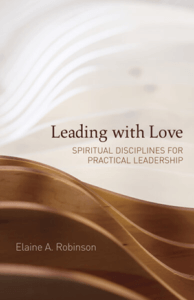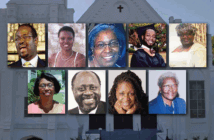
Is your leadership so preoccupied with strategies and actions that you’ve lost sight of the ultimate why? Elaine Robinson shares her belief that God’s love must ground every aspect of the church’s mission. And love must be the foundational principle of all Christian leadership.
Listen on Apple Podcasts | YouTube Music | Spotify Announcer: Leading Ideas Talks is brought to you by the Lewis Center for Leadership of Wesley Theological Seminary in Washington, DC. Subscribe free to our weekly e-newsletter, Leading Ideas, at churchleadership.com/leadingideas. Leading Ideas Talks is also brought to you by Howard Thurman: Prophetic Witness, a Doctor of Ministry track from Wesley Theological Seminary. This track focuses on the power of a prophetic witness like Howard Thurman’s to draw people toward a positive new future. Learn more and apply now for May 2024 at wesleyseminary.edu/doctorofministry. Is your leadership so preoccupied with strategies and actions that you’ve lost sight of the ultimate why? In this episode, Elaine Robinson shares her belief that God’s love must ground every aspect of the church’s mission. And love must be the foundational principle of all Christian leadership. Ann Michel: I’m Ann Michel. I’m a senior consultant with the Lewis Center for Church Leadership of Wesley Theological Seminary and I’m pleased to be your host for this episode of Leading Ideas Talks. My guest today is Dr. Elaine Robinson, who’s a professor of Methodist Studies and Christian Theology at St. Paul School of Theology. And she’s the author of a new book called Leading with Love: Spiritual Disciplines for Practical Leadership. We’re so glad that you’re joining us today, Elaine. Elaine Robinson: Thank you. I’m so glad to be here. Ann Michel: Your book is grounded in a really profound yet simple premise that the fundamental principle of Christian leadership must be love. That is such an obvious point really, but it is a point that is so often missing from other discussions of church leadership. So, I wanted to ask: Why do you think that is? Why do we not focus more on love as a main point in leadership discussions? Elaine Robinson: It’s a great question, and I think in some ways it begins with the idea that leadership is action. To lead is to act. So, we begin with this idea of the how. How do we do this? What are the tips? What are the techniques? What are the ways that I can be effective in leadership? But, you know, if you think about the church, it is the most unique kind of leadership that we will ever face. We have a why that is different from every other human organization that we might lead. And our why has something to do with God’s mission in the world, something to do with the command that Jesus gives us to love God and to love others. And so, when I get students who come in and they just want me to tell them how they can be an effective leader, I’m always saying “We have to know our why first.” Why are we leading? Because we should be leading God’s people deeper into love. God is love. Our calling is to become love. And so, I actually talk about the church as being a laboratory for love. Our leadership has to be about that why if the how is really going to serve God’s mission in the world. Ann Michel: Thank you for that point. I sometimes talk about “the importance of why” as being a really fundamental thing that we need to ground our leadership in. And you’ve taken us back to the ultimate why. So, thank you for that. I wonder if you might give an example of how leading with love might be different from other ways that we might approach leadership. Elaine Robinson: Leading with love is about having a mind-set and a skill set that fit the twenty-first century. If I’m leading with love, I’m developing emotional intelligence, for example, where I am not only thinking about what I want and what I expect to happen, but I’m also thinking about what that other person loves, who that other person is. I give a simple kind of example. Before the pandemic, we had a handbell choir at the church I pastor — I’m also a pastor as well as a professor. Another church came to us very recently and asked if they might purchase our handbells. Since the pandemic, we don’t have the handbell director anymore. We don’t have a choir playing that music. But I knew that I couldn’t just say, “Yes. Let’s sell these handbells.” In fact, I had to go to members of the church, former members of the handbell choir, leadership in the church and ask, “What if we did this?” But I also knew the first response would be, “No. We can’t sell the handbells!” Now every leader in the church is going to understand this because that’s the way the brain works. The first thing the brain will do is relate to past experiences and relate to emotional content. So, they’re remembering being with their now-transitioned parents. They’re remembering a wonderful Christmas. They’re remembering all these things that say, “We have to keep the handbells.” But if I’m patient and say, “I hear you. I hear that there are a lot of things associated with those handbells that you really love,” they will then allow their cortex to begin to process and to think. And once they’re able to take a step back, then they can say, “You know what? It probably glorifies God more to be using the handbells. Maybe we should sell them.” If I interrupt them at that point where they’re having their emotional content, then they’re probably going to get stuck there because I’m pushing back. But if my love realizes the connections that this handbell choir has for them, then I can give the space and the time for them to say, “Okay. I love this, but my mind knows it might be the right time.” Ann Michel: I really appreciate how in your book you mentioned emotional intelligence and talked a lot about how people process things, how the brain works, and being sensitive to all those things related to the emotional intelligence of leading. You mentioned already that your book isn’t really about the how. It’s not about tactics and strategies, whereas so many other leadership books are. Your book really steps back from that and looks at a series of principles or practices that, the way I understood it, can help a leader open their mind and expand their worldview, maybe helping them to see the world through God’s eyes or, to use scriptural language, “to have the same mind in them that was in Christ Jesus.” So, I wondered if you might just name a few of those practices that you explore in the book and talk about why they’re important. Elaine Robinson: If we look at 1 Corinthians 2:16, that’s where Paul says, “but we have the mind of Christ.” And there is this idea that I work with in this book that says all of us as human beings see partially. And often we’re only seeing out of our own lenses and experiences. To take on the mind of Christ is to move us beyond my way, my desire, my likes, my this, my that, and into a much more holistic perspective where we’re able to see also through the eyes of others and the way they’ve been formed and the things that matter to them. If we want to grow into the mind of Christ, there are certain practices that we need to take on as leaders. The first is what I call deep listening, which is kind of an ancient Christian practice of stopping our thinking and stopping our feeling and just opening ourselves to hear from God. I am reminded when I study and read the prophets that what goes wrong is always that people are not listening to God. The prophet always says: If you would just listen, you would be healed. Given the world we live in today — how noisy it is, how much background noise there always is — we need to find ways to be still and know that God is God. We need to be still and listen. Out of being able to listen to God comes a number of other practices. I will point to a second one, which is growing. So often, when we’re in leadership, we find that our people have gotten stuck. They think there’s only this way to do church. And you’ll hear so often that “my people don’t want to change.” Well, part of that I think is because we haven’t helped them to see that growing is a basic principle that God has put into the whole of creation. I have this chapter about what it means to grow, what it means to teach our people beyond the childhood biblical stories to a deeper understanding and a deeper engagement of God in the world. So those are just two of the principles that I’m putting out there. Ann Michel: I really love the way you frame the idea of growth and change itself as a spiritual imperative. So many churches struggle with the notion of change, so to put that frame around it really is helpful. I was struck as I read your book that in some ways it seemed to me to be a systematic theology of Christian personhood focused on some of the basics of what it means to live in a relationship with God and with Jesus and with our neighbors in authentic ways. It seems those things are relevant in the lives of all believers, and yet this is a leadership book. So, it caused me to wonder: As you understand leadership, what is leadership? And who’s a leader? Elaine Robinson: It’s a great question. If you read authors who write on church leadership — let’s just take Lovett Weems for one — there’s always this idea of a faithful next step. And I do think it’s always about where we’re going and not where we’ve been. But for me, church leadership or leading any kind of faith community is about faithful and hopeful attention, paying attention, to growing into God’s promised future as it draws near in this time and place. Now, I do gear the book toward pastors, toward the shepherds of the flock, because if they are not growing in love then they can’t model and bring others along. Because I teach leadership courses to seminarians, this is really important to me, that our pastors learn that leading requires us to be growing in love ourselves. But I think you’re absolutely right that this is true of all Christians that, if we’re on this journey and on this path, whoever is still growing behind us, in a way of metaphorically speaking, we should be leading them. Our love should be infectious. Our love should be leading others to want to follow Christ as well. So, while I do focus on leaders, I think it does have a lot of application for anyone who wants to be a follower of Jesus. Ann Michel: You mentioned Lovett Weems and the idea of paying attention. He often talks about paying attention as a spiritual discipline. I think when many of us hear the term spiritual discipline, we think of prayer or fasting or labyrinth walking or scripture reading or perhaps giving — actions that are undertaken perhaps as acts of piety. But you seem to have a more practical and basic understanding of what a spiritual discipline is. A lot of the practices that you discuss are very organic, really and holistically entwined with how we learn to apprehend the world and others. And since the title of the book talks about spiritual practices, how do you define a spiritual discipline? And what makes the practices in your book spiritual? Elaine Robinson: If we look at what spirituality is, for a lot of authors — Ron Rolheiser or Barbara Brown Taylor— it’s about longing or desire. I think that longing or desire is just what leads us into spiritual practice. But spirituality itself is really about God’s love growing and living in us and overflowing into the world. It’s about becoming complete. It’s about being whole as God has created us and all of creation to be. If I use Ephesians 3:14–19 when Paul is talking about being rooted and grounded in God and rooted and grounded in love so that we might be filled with the fullness of God, we have to find ways and practices that open us to God, that open us to listen, to pay attention. I absolutely believe in fasting and reading scripture and prayer and in all of these disciplines — but not so much. This is where I think we sometimes miss the mark. We make spiritual practices about me. About what I’m feeling. About what I’m experiencing. But that’s not the gospel. Because the gospel is: Once we were broken and separated, but in and through Christ we become one, we become related. So, spiritual practice should lead us into love. Now, let me say this. Love is always a relational quality. You can’t have love without the beloved, so the more we love the more reconciliation and relationship is happening. In other words, our spiritual practices are opening us to God so that we might become more related and filled with love of the whole of creation. That’s a lofty kind of “wow” thing, but ultimately that’s what God is at work doing. Ann Michel: I think what’s so refreshing about your book is that it really puts it in that perspective. I have to confess that I’ve often struggled with what people call spiritual disciplines because for a long time I thought it was about doing the thing. When in fact, the whole purpose of doing the discipline is to have the same mind in you that was in Christ Jesus. It’s not the action itself, but what it allows you to do. That was really a breakthrough for me. A lot of people in churches think they just need to do these things without understanding the why — again going back to your why. Elaine Robinson: Exactly. It’s about me getting out of myself and into that network of relationships. If it’s all about me and what’s happening to me, then I am not living the gospel. because the gospel is a we. It’s being related to God and to others. Ann Michel: For the benefit of our listeners, one of the chapters in your book is about the idea of connecting with your neighbors, connecting with your community as a spiritual discipline in exactly the way that you’ve just been describing. In the conclusion of your book, you wrote something that caught my attention. You said that “It’s not our job to save the church. The only true standard of our success is if we’re leading with love.” I think for a lot of church leaders it probably doesn’t feel that way these days, so I wanted to give you a chance to unpack your belief that “we cannot fail if we’re truly leading in love” and how by leading in love we can find that hopeful, faithful future for the church. Elaine Robinson: Absolutely. Well, the first thing is that the church is intended not to be simply an institutional human reality. When I talk to my congregation about the church, I’m always saying the church has to have spiritual roots. This body of Christ is rooted and grounded in the Spirit if it is of God rather than just of humans. And if we look historically, we know that the church is always recreating itself, and we are probably in an era of reformation in some ways. Things are changing. If we are leading with love, if we are being filled with God’s love, if we are listening to God, if we are teaching our people to love those who are beyond the walls of the church, it may not end up looking like what we expect. But God’s ecclesia will still be thriving in the world. And I like to say Jesus didn’t give us a blueprint for the church. There is no one way of being church. As long as the point is that we are helping people become healed and whole by God’s love and pouring that love out into the world, then we are doing God’s mission as the church. Ann Michel: Thank you. Thank you for that. You’ve mentioned that you wrote this book primarily for an audience of pastors or perhaps for others in positions of leadership. But to begin to draw this to a close, I wondered, it seems as if the practices that you describe are also community practices. They’re not just for an individual leader and you talked about how a leader might model it, but what are some steps that a leader might take to encourage the whole community of faith to be more deliberate in some of the practices that you discuss, such as deep listening, or connecting with the community, or learning to love yourself so you can love others. How might the whole church take on some of those practices? Elaine Robinson: Well, there’s a lot that’s going on in the book for sure, and to just say, “Here. Do all these things,” I think might be overwhelming. But there’s one thing I want to say first. None of us is ever really the leader. Jesus is really the leader. Even the pastor should be following Jesus just a little closer and be a little better at listening to where Jesus might want to go. But begin slowly. Introduce slowly. I have been introducing these practices, these principles, in my congregation for six years now and it’s helping them grow. You have to know how far you can take these people, faithful people, at this time. I tell my students that leading a church is more like steering an ocean liner than a speed boat. If you turn too quickly, you’re going to tip the thing over. So, you have a sense of God leading by stages as God leads the people through the wilderness. You begin here. You begin with love. You begin with reminding them of the spirituality of the church. And as some of this begins to take root, then you can introduce more and more pieces of this. And so, this is a long-term project. It’s a lifetime of work to learn to love and to lead with love. Ann Michel: But as you said earlier, it begins with taking that first faithful step. And I think that you give a lot of examples in your book of it really being a progression. I think the way that you lay subjects out in the book does give people a sense of how they could begin. Elaine, I want to thank you. I found your book so refreshing because of its emphasis on the basic spiritual underpinnings of leadership so often missing in the other literature of church leadership. I really, really appreciated your book. I’m grateful that you’ve taken the time to talk to us today. Thank you so much. Elaine Robinson: Thank you. This has really been a pleasure. Announcer: Thank you for joining us for Leading Ideas Talks. Don’t forget to subscribe to our free weekly e-newsletter, Leading Ideas, to be notified when new episodes are published. Visit churchleadership.com/leadingideas. Leading with Love: Spiritual Disciplines for Practical Leadership (Fortress Press, 2023) by Elaine A. Robinson is available at Fortress Press, Cokesbury, and Amazon. Photo by Akira Hojo on Unsplash
Read in-depth interview
Watch on YouTube

 The Doctor of Ministry — Howard Thurman: Prophetic Witness
The Doctor of Ministry — Howard Thurman: Prophetic Witness
What does it mean for a leader to stand in the gap between the way things are and what they could be? Howard Thurman’s prophetic witness exemplified this form of leadership. Thurman did not demonize those responsible for systemic ills. Instead, he emphasized a positive vision of the way things could be. This track of doctoral study from Wesley Theological Seminary focuses on the power of a prophetic witness like Thurman’s to draw people toward a positive new future. Learn more and apply today for May 2024.

Related Resources




